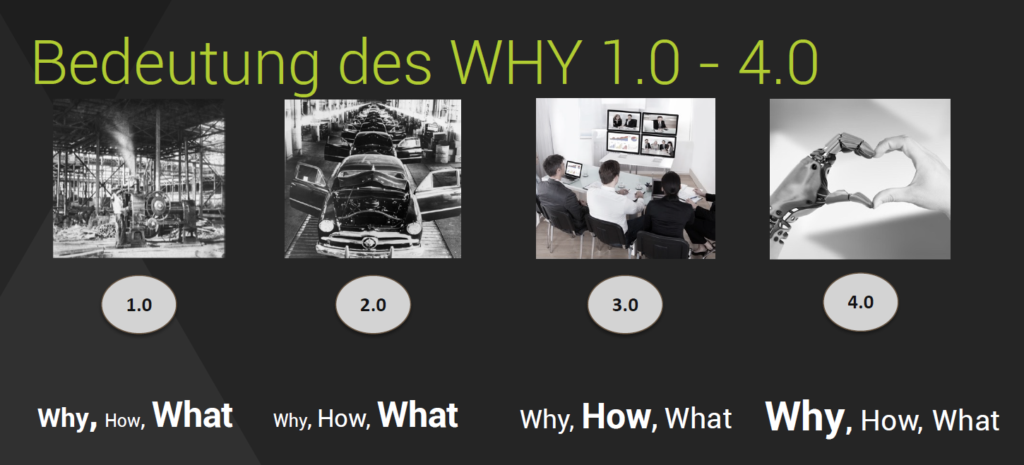Times of Change – Industry 4.0
Managing Change for Executives
Never before has change in our professional world been as fast paced and revolutionary as today. We are speaking of the emerging working world 4.0, characterized by volatility, uncertainty, complexity, and ambiguity – a “VUCA world”.
The buzzword “industry 4.0” describes the so-called “fourth industrial revolution”, where digitally controlled systems in manufacturing industries communicate through internet technologies.
The term stands for change, uncertainty, pressure to adapt, different roles, and agility. Industry 4.0 not only refers to change at the level of technological products like robots, chip implants, or smart glasses, but also implies new technological opportunities which impact the working world and have consequences for all areas of our society and economy.

Photo: fourpointzero
Transformation is a process that takes time and requires an inner and outer willingness to change. Those refusing it will come under great pressure from the outside and be subject to forces determined by others. Ticket counters and traditional cash registers are disappearing, touchscreens the norm, and today’s iPhone gets updated over night and keeps changing.
«Change only favors minds that are diligently looking and preparing for discovery.»
People react very differently to change. Some embrace new technologies and are quick to develop the skills necessary to handle them proficiently. For many, though, change equals risk and comes with fear of the unknown. Letting go of familiar habits causes uncertainty and is never easy. We all know inner resistance to change forced onto us from the outside, which finds expression in excuses like: “my personal situation does not allow for it right now” or “first the others”.
«Courage and credibility go hand in hand.»
Leading in the Digital Age
Our ancestors were expected to provide answers to the question “what is to be done?”. Later, superiors were expected to be competent professional contact persons with experience and knowledge, which they were to pass on to their staff. There was one who pulled and others that followed. This two-dimensional image had been valid over a long period and led to progress in the industrial age. In the digital age it can no longer render today’s complexity in the new professional world. Answers to hitherto unknown questions must be found through trial and error, guesswork, inventions, developments and discoveries. It is the question “why” that is in the heart of this. Familiar top-down structures are outdated and no longer helpful. The chain of command principle has outlived its purpose. Digital change requires new answers at management level. The key is in supporting others and learning, constantly acquiring new know-how, expanding your horizons and creatively adapting. Modern managers are no know-it-alls, but meet their team at eye level. Instead of giving orders, these superiors together with their team reflect on the most promising success strategies for the company. Agile leaders are in demand as catalysts for ideas and motivators, because team players and individualists have to be brought together to move ahead. There is a need for experts in communication and organization.
The following principles illustrate the change in values that allow you and your company to prevail and to develop in the age of digitalization.
Principle 1: Empathy boosts success
Digitalization leads to alienation and individualization. Superiors are challenged to put themselves on an emotional plane with their team members. If staff feel appreciated and comfortable their motivation increases, along with their engagement – an important prerequisite for innovation.
Principle 2: Mechanization requires more emotional intelligence
The broader the use of unfeeling and soulless technology within the corporate world, the greater the need for conscious personal and emotional relations.
Principle 3: Superiors should provide guidance
The less structured and stable the working environment, the stronger the longing for guidance and security among staff. This is a leadership task. It takes a relationship based on mutual trust and respect.
Principle 4: Leadership means offering and living relationship
It is important for managers to take their time when voicing criticism or making suggestions for improvements and to find a solution together with the team members. Misunderstandings are detrimental to the relationship.
Principle 5: Leadership means providing a sense of purpose
Professional prestige is no longer important for generation Y. Search for meaning and fulfillment are core. What is required are creative methods that take individual needs into consideration.
Principle 6: Superiors as a “brand”
Live and communicate values, convictions, and strengths consciously so that they become an unmistakable “brand” for staff. If you are authentic and stand by your values you will win their trust.
Principle 7: Networking furthers accessibility – online and in person
It is easy to hook up with a lot of people via social media like Facebook or LinkedIn. Equally important, though, are off-line contacts. Relationships may well be initiated online, but trust requires face-to-face meetings.
VUCA stands for Change
The term VUCA is an acronym and stands for volatility, uncertainty, complexity, and ambiguity. It stems from military use to refer to the changing world after the cold war.
In Zulu, however, “vuca” stands for “waking up”.
The acronym VUCA describes conditions that trigger strong emotions, the Zulu word “waking up” describes a process.
VUCA and vuca are complementary. We choose how to approach unavoidable developments. No matter whether the glass is half empty or half full, what’s important is our next step: e.g. re-filling the glass, emptying it, smashing it, etc. “Paths are created by walking” has been Proitera’s motto for 20 years already – an old adage which is gaining ground. Waking up means dealing with the glass to then venture into the first step.
We suggest a positive approach to times of change. They stand for overcoming the old and establishing what’s new. Let’s go down our path of discovery and learn that transformation opens up new horizons and makes us alive, because transformation and change are part of our lives.
«In a changing world the choice is that of changing or being changed»
Our seminar «Managing Change» for staff and managers explores the topic industry 4.0. Go to seminars and courses for more information.
Industry 4.0: This is what our clients say
«Throughout the years we have been working with Proitera we have continuously stepped up the offer. Employees make good use of this neutral support and as employers we value the service. In our management workshop we addressed the topic of leadership culture/change. Proitera’s seminar "Managing Change" was a perfect conclusion of the workshop. It did not focus on technical issues and terms but succeeded in speaking also to plant managers. Interested parties could take a lot of input home.»
